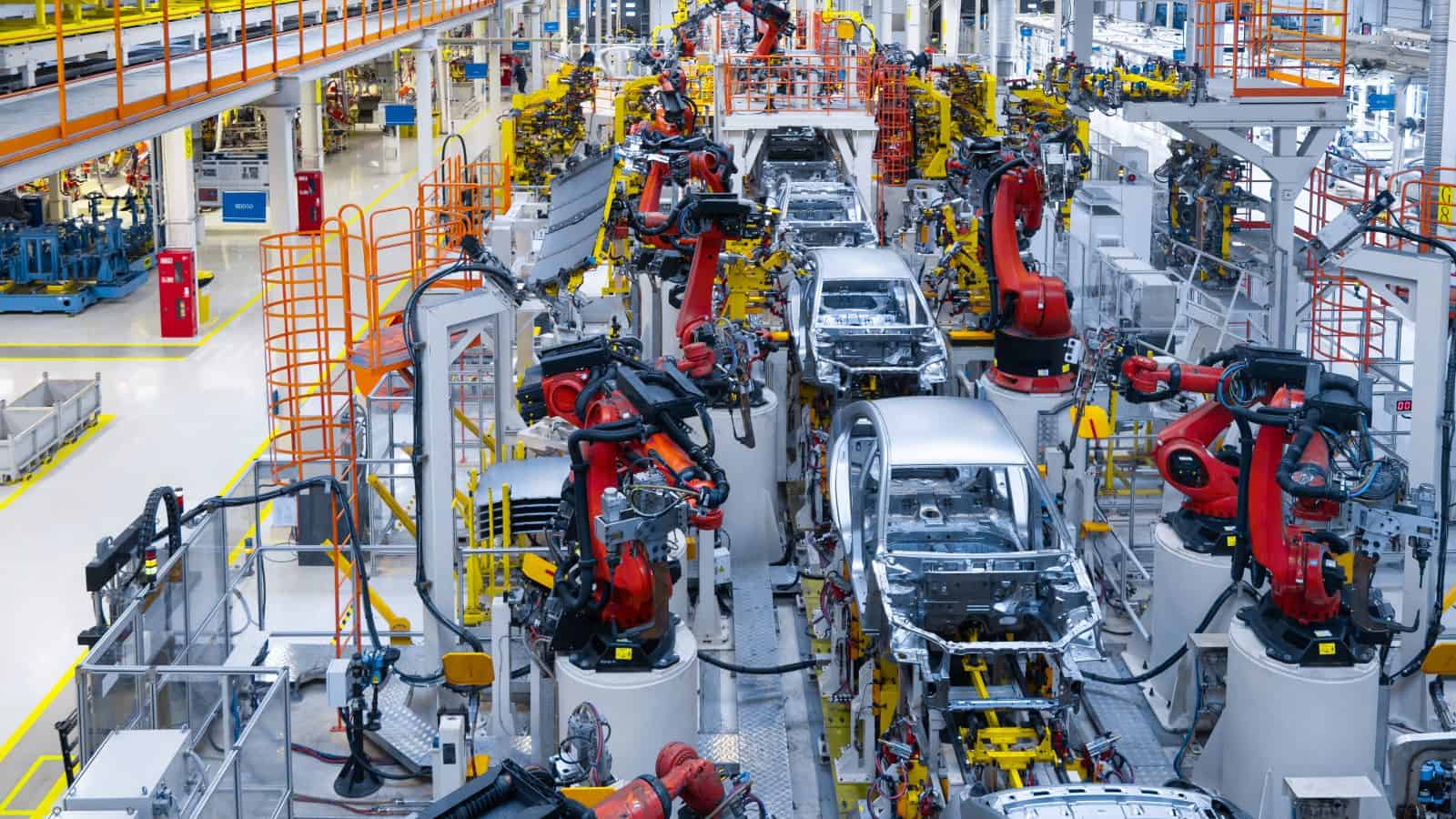Hannover Fair 2023: It’s Not Technology Anymore. It’s All About Data, Data, Data.
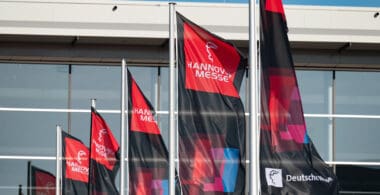
Whatever advanced technologies manufacturers adopt, future transformational success will ultimately depend on data, from powering the latest digital tools to deliver more value, to creating entirely new industry-wide data ecosystems, to the foundation of enticing new Industrial Metaverse applications for the future, reveals this year’s Hannover Fair in Germany.
Emerging from three years of COVID disruption, the world’s largest industrial fair in Hannover, Germany, began to bounce back this year with a renewed sense of optimism about the future of digitally enabled manufacturing, hosting more than 4,000 exhibitors from 62 countries showcasing their latest innovations, and over 130,000 visitors from around the world.
Many of the impressive and varied transformational solutions on display, however, also revealed a fundamental change of emphasis from years gone by. This year, Hannover was a lot less about promoting individual products and technologies, and much more about the underlying power of data to fuel those advanced digital tools in order to drive greater efficiencies, resiliency, value, and sustainability, for both internal operations and entire manufacturing value chains.
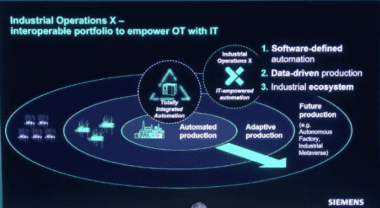 “Without data, we will never take manufacturing to the next level and scale,” declared Rainer Brehm, CEO of Factory Automation at Siemens, launching the company’s new Industrial Operations X approach, which is based on the three pillars of software-defined automation, data-driven production, and access to an open, industry-wide data ecosystem.
“Without data, we will never take manufacturing to the next level and scale,” declared Rainer Brehm, CEO of Factory Automation at Siemens, launching the company’s new Industrial Operations X approach, which is based on the three pillars of software-defined automation, data-driven production, and access to an open, industry-wide data ecosystem.
Manufacturing X
The use of the letter X in the Siemens’ nomenclature is highly significant. It echoes a new and rapidly emerging industrial data sharing initiative in Europe called “Manufacturing X”, an approach showcased by multiple companies throughout the 17 busy exhibition halls at this year’s event.
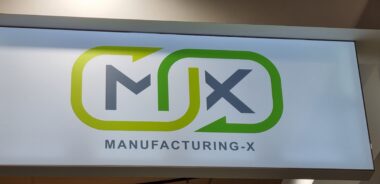 Manufacturing X aims to create a safe and agile next generation data infrastructure for manufacturing industry players to network, share, and exchange key product and other information with approved partners and customers in a compliant, standardized way, solving many of the current issues companies face in creating end-to-end real-time visibility across supply chains and making it easier for manufacturers to drive and scale transformational change.
Manufacturing X aims to create a safe and agile next generation data infrastructure for manufacturing industry players to network, share, and exchange key product and other information with approved partners and customers in a compliant, standardized way, solving many of the current issues companies face in creating end-to-end real-time visibility across supply chains and making it easier for manufacturers to drive and scale transformational change.
The concept envisages a federated cloud-based “data space” where companies can upload dedicated “data containers” housing fully detailed, standardized information on any manufactured product or service, whether that is a factory machine tool or a wind turbine. Each data container can include key information ranging from authenticated product documentation (sometimes known as a Product Passport) to full maintenance and service manuals, compliance details, lifecycle frameworks, performance data, CAD files, ready-made digital twins, and even details of the carbon footprint of each unit or component.
In the same way that standardized freight containers revolutionized the freight transport industry, explained the team at German automation company Phoenix Connect, Manufacturing X aims to create an industry-wide data ecosystem where standardized containers of data can be easily accessed and securely shared across qualified partners and customers within a manufacturing value chain.
Easy access to the digital twin of each manufacturing asset, for example, can make it far simpler for companies to build plant-wide virtual digital twins, or train service engineers to troubleshoot equipment issues, and detailed production specifications can be instantly shared with key manufacturing partners to help cut time to market for new products or mitigate sudden supply chain disruptions.
Based on open standards and interoperability, Manufacturing X also aims to break industry dependency on today’s proprietary systems and networks by building an open and trusted framework that allows all industrial companies, automation providers and manufacturing customers alike greater control and sovereignty over their data in the future.
Many examples of this new X data space concept were already in action at the Fair, including the advanced Production Level 4 ecosystem created by German research group SmartFactory KL, in which a rapidly reconfigurable, modular, shared production line harnesses interconnected machines and technologies from multiple suppliers, combining advanced digital process tools, AI, collaborative robotics, its own implementation of the data space concept called SmartMA-X, and the Asset Administration Shell (AAS) specification, which creates detailed standardized descriptions of each individual asset.

“Manufacturing X represents the next stage of Industry 4.0,” Dr. Gunther Kegel, President of the German Electronics and Digital Industry Association, ZVEI, told German Chancellor Olaf Scholz and the packed audience of senior industry leaders and dignitaries at the Hannover Fair’s high-profile Opening Ceremony on the eve of this year’s Fair. Manufacturing X, he continued, is an important element in the creation of a safe and secure industrial data economy of the future that fosters increased networking, resiliency, sustainability, and climate protection among all industry players.
Foundations of a Future Data Economy
Manufacturing X is only one implementation of a much broader data ecosystem concept called Gaia-X, initially conceived as a European initiative in 2019 but now with evolving global ambitions.
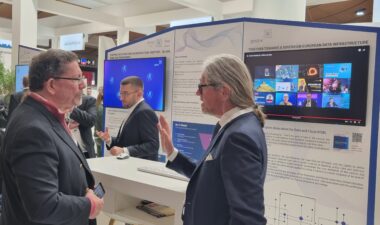
Gaia-X aims to build the foundation of a future data economy across multiple industry sectors based on the same idea of a shared and secure data ecosystem, explained Gaia-X CEO Francesco Bonfiglio, in an interview with MLC.
Other implementations include Catena-X, designed to support auto industry companies to share data on products and parts across their value chains. It has already attracted many leading auto industry partners, including BMW, Mercedes Benz, Volkswagen, Ford, Volvo, Renault, and tire maker Continental, plus technology innovators including Microsoft, IBM, SAP, Siemens, Fujitsu, Hewlett Packard, and many more. A health industry X-version for the pharmaceutical and medical devices sector is also preparing to launch in the near future, with future plans for similar data ecosystems covering other sectors including aerospace, agriculture, energy, logistics, and more.
Ecosystem Challenges
Such next generation industrial data ecosystem initiatives are both innovative and ambitious, but they are still in their early stages and there are many challenges yet to be overcome, from political infighting among European members, to the practicalities of sector-wide implementation.
In a panel discussion entitled “Towards a Federated Industry Data Ecosystem”, representatives from the Industrial Digital Twin Association (IDTA), Gaia-X, BMW, and German automation company Festo were candid about a host of challenges ahead for companies, as well as the industry as a whole, in building data ecosystems.
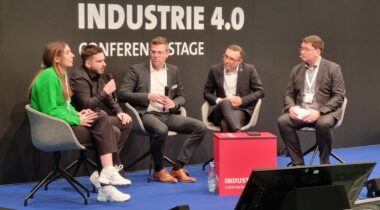
Chief among the challenges the group identified were establishing trust among participants; assembling a critical mass of participants to make an ecosystem work properly; understanding and adopting a common legal framework to enable intellectual property protection, an important foundational element of trust; and dealing with the technological complexities of such elements as data spaces and data containers.
But perhaps the most significant challenge voiced by the panel was bringing along small and medium size manufacturers, a group that often doesn’t have the focus, expertise, and financial wherewithal to undertake what by any measure will be a significant effort to adopt and operate data ecosystems.
To help bring the small manufacturers along, the panel recommended the development of technology tool kits to simplify the development of new business models based on the data ecosystem idea. One such example already exists within the Catena-X group.
The other emerging consideration for any manufacturers adopting the data ecosystem idea is how it will affect their competitive profile as well as the competitive landscape of the markets in which they do business. Will participation in such ecosystems, should they take hold in a substantial way, become essentially a requirement in order to remain competitive? By establishing a common data playing field, will manufacturers then be able to compete on higher level factors such as more targeted products and services?
And what of potential legal issues? Will such data ecosystems be viewed in some countries in an antitrust light, prompting challenges by non-participants and government bodies? There will clearly be more developments to come in the months ahead.
Inspiring Innovations
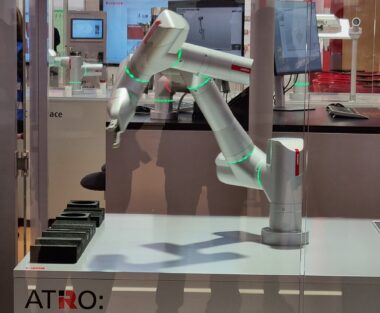
There was certainly no shortage of inspirational technologies on the stands at this year’s Hannover Fair, of course. Advanced digital twins were everywhere; AI is being embedded into almost every kind of offering; 5G is now the connecting technology of choice; and systems specifically designed to support sustainable operations – from advanced energy efficiency algorithms and on-site hydrogen production units to digital threads and twins supporting full circular economy strategies from initial product design to end of life reclamation.
AI Everywhere: Now It’s Time to Scale
The critical importance of data to drive these ever-advancing digital tools is perhaps most evident with AI systems, which were extensively showcased across the Fair this year.
While a decade of adoption of M4.0 technologies has made data better organized and more available than ever before, “An estimated 80% of data in industry remains unused,” noted Philippe Rambach, Chief AI Officer at Schneider Electric. “So, the time for AI in industry is now,” he continued, “and the next stage is to scale.”
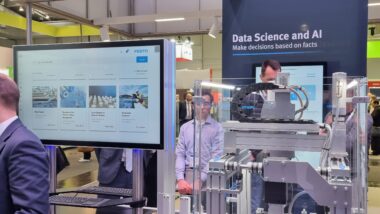 A number of suppliers admit, of course, that overcoming the challenges of adopting and scaling AI is still a learning journey for many manufacturing companies, so products like Altair’s RapidMIner or Festo’s Automation Experience (AX) AI platform for predictive maintenance, among others, are designed to provide easier entry points for companies new to the AI arena.
A number of suppliers admit, of course, that overcoming the challenges of adopting and scaling AI is still a learning journey for many manufacturing companies, so products like Altair’s RapidMIner or Festo’s Automation Experience (AX) AI platform for predictive maintenance, among others, are designed to provide easier entry points for companies new to the AI arena.
Schneider Electric, meanwhile, is already applying AI in multiple ways across the company, explained Rambach, from energy optimization to driving an increasingly self-healing supply chain that supports a network of around 14,000 suppliers and 150,000 order lines a day. He identified three key areas of business focus for AI the company – to enhance customer facing services, to improve internal process efficiencies, and as an advisory tool to provide monetized consulting services in areas such as energy management and industrial automation.
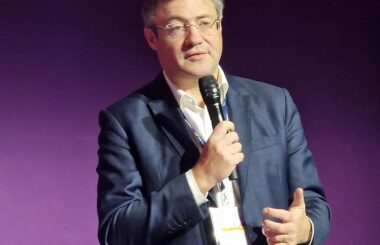
Based on his experience, Rambach advises manufacturers to approach AI adoption with three key considerations in mind. First, don’t start with AI; start with a use case that can deliver value and then ask if AI can help. Secondly, build a joint AI team made up of data specialists merged with people who have real front-line domain knowledge. In fact, Schneider’s AI team is not allowed to launch any new product in the company until it has been tested and verified by workshops of domain experts and frontline workers. Finally, to help build trust and support in AI adoption, socialize successes within the company to get all levels of employees engaged.
And to help companies ensure the AI systems they develop deliver meaningful and unbiased results, the Fraunhofer Institute was also showcasing its “Trustworthy AI” toolset on a nearby stand. This provides companies with a framework to test the quality and worthiness of their AI solutions, especially in human-dependent applications such as plant safety, medical advice, chemical processing, or even traffic management. Such formal testing and approval criteria will become increasingly essential, says Fraunhofer, with the rapid emergence of popular new generative AI tools like ChatGPT.
Omnipresent Digital Twins
While AI permeated many areas of activity, there is also little doubt that digital twins have become a primary foundational technology in driving the future of digital manufacturing across multiple application areas. Almost every digital solutions provider at the event had one or more digital twins on show, from digital versions of individual products or factory assets to full plant floor planning and monitoring systems, to end-to-end lifecycle process and circular economy applications.
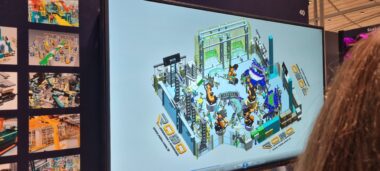
Many of those digital twin examples were built around the rapidly dominating Asset Administration Shell standard, which allows greater compatibility and interoperability between different digital twins and is backed by a collaboration between the OPC Foundation’s Open Architecture standard and the IDTA. In fact, digital twins are now so commonplace that many suppliers are proactively including digital twins of their products with every purchase so customers can more easily integrate them into their own systems for maintenance, plant floor planning, and other key use cases. These include companies like Siemens, Festo, or Harting with its product life-cycle digital twin.
The Sustainability Imperative
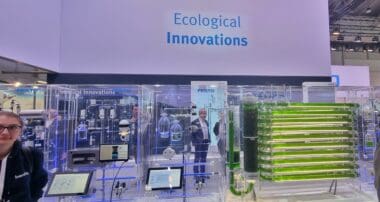
With Germany’s ambition to become the world’s first climate neutral industrial economy in the world by 2045, the presence of digitally enabled green industrial solutions was also far more in evidence than at any other previous Hannover Fair. Every company either had an explicit focus on energy reduction or showcased green energy production and infrastructure innovations – from improved plant-scale energy management applications to digitally supported processes for battery production and on-site energy storage, new low-scale green hydrogen production systems, systems for easier monitoring and reporting of Scope 3 supply chain partner emissions, and circular economy lifecycle digital twins with precise details of reclaimable content and dismantling procedures for recycling key materials and components.
One other innovative green-energy focused display was SEW Eurodrive, which has developed a family of automated guided vehicles (AGVs) that know when their power is low and can autonomously replace their own power packs with new hydrogen fuel cells as needed.
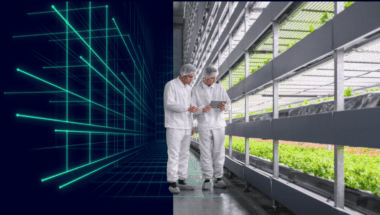
Siemens, meanwhile, showed an impressive example of how combining multiple digital technologies including AI, robotics, and visual inspection can autonomously manage vertical farms capable of delivered 300 times more fresh food yield on a comparable area of ground, using 95% less water than traditional farming methods, but without the need for any harmful pesticides or fertilizer run off.
The Dawn of an Industrial Metaverse
But perhaps the most forward-looking and engaging displays at this year’s Fair, and there were many of them, were multiple examples of emerging Industrial Metaverse applications in action. These combine multiple technologies including advanced digital twins, embedded AI, VR/AR visors, and rapid 5G communication to show how early Metaverse use cases could create collaborative virtual spaces for training, e-commerce, remote operations, factory design, product maintenance, and troubleshooting.
Once again, it is data that will drive this latest digital evolution, believes Charlie Sheridan, Technical Director of Industry Solutions/Manufacturing at Google Cloud. “Data is the foundation of the Industrial Metaverse journey”, he believes.
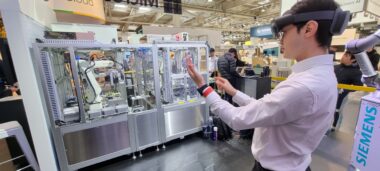
On Microsoft’s stand, for example, partner Kawasaki was using an advanced digital twin, combined with embedded AI and engineers wearing HoloLens mixed reality headsets, to show how they could work together remotely from anywhere in the world using a collaborative mixed real world/virtual environment to exchange expertise in real time to troubleshoot and fix equipment problems. “It’s the beginning of a new era,” predicts Kawasaki.
Early Industrial Metaverse applications are not all just pilots either. Real life projects are already in place at auto companies such as BMW and Renault where they are being used to create virtual factory and plant floor environments, while global chemical giant BASF is reported to have 20 Metaverse projects underway, and Norwegian battery maker Freyer is now using Siemens Metaverse technologies to help scale production capacity at both existing and new plants in rapid time to meet the predicted 700-fold increase in global demand by 2030. “We are already paving the way into the Industrial Metaverse of the future,” asserted Siemen’s Brehm.
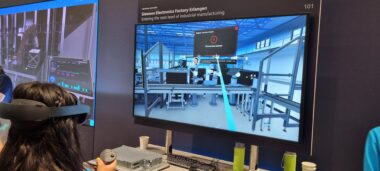
The momentum around Metaverse developments is certainly growing fast. The recently launched Metaverse Standards Forum, noted Dietmar Laß, senior researcher manager at the Fraunhofer Institute, already has over 4,000 members and is expanding fast. “We are only getting a glimpse of what may be possible now with the Industrial Metaverse, but the basics are already in place”, said Laß.
Perhaps the promise of an immersive world for future production operations, where virtual and augmented realities take digital twins and collaborative cultures to a new level, is closer than many industry leaders may think.
The Future of Data
When Stephan Weil, Minister of Lower Saxony, officially began the opening of the Fair on the Sunday evening, he hoped that the 2023 event would reveal how the power of innovation can help solve some of the world’s toughest problems, help companies balance sustainability with growth, and help foster an equitable balance between people and machines working together.
Yet, as the days went by, there was clearly more to the event than just a series of high aims this year in Hannover. There was also a fundamental sea change of emphasis across the Halls that revealed a new focus on data and perhaps a more mature ecosystem direction for future innovation and adoption to enable industrial companies to truly accelerate transformation and drive greater value.
As German industry 4.0 pioneer, founder of the German SmartFactoryKL research initiative, and former MLC Board member Detlef Zülkhe reflected: “Hannover is not about technology anymore. Today, it’s all about data, data, data.”
About the authors

Paul Tate is Co-Founding Executive Editor and Senior Content Director at the NAM’s Manufacturing Leadership Council.

David R. Brousell is Co-Founder, Vice President, and Executive Director at the NAM’s Manufacturing Leadership Council.
